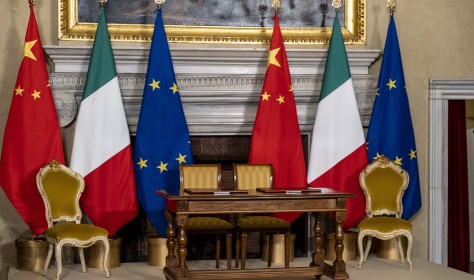Conference
Italy, Europe, China: academic influences and economic imbalances
Wednesday, 6th March, 5pm
Sala Zuccari – Palazzo Giustiniani
Via della Dogana Vecchia, 29 – Rome
Opening remarks
Sen. Giulio Terzi di Sant’ Agata President of the Senate Committee on EU Policies
SESSION 1
THE CHINESE INFLUENCE IN THE ITALIAN ACADEMIC AND CULTURAL WORLD
Over the last ten years, the global scenario based on international law and shared rules has suffered an increasing number of threats and attacks which have jeopardized democratic stability and national security, particularly in the West. Numerous countries, including Italy, suffered hybrid “campaigns” carried out within a changing geopolitical and technological context in order to influence national debates and interfere in electoral processes. On of the targets hit by foreign influences is the academic dimension. Malevolent activities can undermine the autonomy of universities and lead to a crucial loss of ethics and integrity in academic research. Universities and think tanks play a fundamental role in any democratic society and they have to be protected from the subtle threat posed by authoritarian States which clamp down on freedom of thought and expression, and thrive on censorship, manipulation and revisionism.
Giulia Pompili Journalist for Il Foglio
André Gattolin former Member of the French Senate, GCRL Honorary member
Andrea Merlo Member of the GCRL Scientific council
Luke de Pulford Executive Director of the Inter-Parliamentary Alliance on China
Antonio Stango President of the Italian Federation for Human Rights
Moderator Matteo Angioli
SESSION 2
ITALY, EUROPE, CHINA: ACADEMIC INFLUENCES AND ECONOMIC IMBALANCES
In September 2023, the European Parliament’s Committee on Transport and Tourism (TRAN) published a in-depth research into Chinese investment in European maritime infrastructure. The study identified 24 Chinese acquisition transactions which exceeded the value of 9.1 billion euros, and 13 greenfield investment projects worth approximately 1.1 billion euros. The analysis shows that economic coercion, risks of cyber attacks and a deliberate strategy to exploit infrastructures to one’s advantage, even in potential conflict scenarios, are real. China, a country that the EU has an abysmal trade deficit with, implements aggressive policies with a view to making their partners increasingly dependant on Beijing. Italy’s exit from the Silk Road stands out as a clear indication for other EU Member States that the strategic partnership with the Beijing has to be reevaluated.
Gianni Vernetti Columinst for La Repubblica, former Senator and Undersecretary of Foreign Affairs
Marco Casale Editor-in-chief of PortNews
Claudio Pagliara Rai correspondent from the United States
Simona Benedettini Independent consultant on energy policies
Francesco Galietti Strategic scenarios expert, professor of Political risk analysis at LUISS University, CEO of Policy Sonar
Beniamino Irdi Senior Fellow presso Atlantic Council
Moderator Ottavia Munari
Closing remarks
Sen. Giulio Terzi di Sant’Agata President of the Senate Committee on EU Policies

